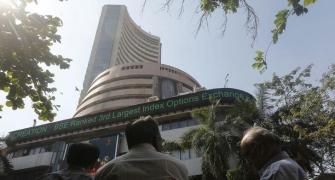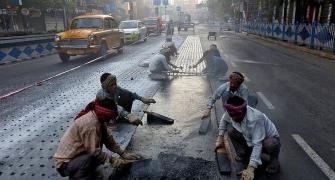It was a landmark, indeed! But fiscal policy purists were dismayed over the growing size of the government's expenditure without a commensurate rise in revenues, which as we all know, widened the fiscal deficit to 6.8 per cent of GDP for the current year, the highest level since economic reforms began in the 1990s.
However, there was another reason for an even bigger dismay, although nobody so far seems to have lost much sleep over that. The Budget for 2009-10 will get Parliament's approval in less than four weeks, compared to almost ten weeks that the government usually takes to complete the process.
Why get the Budget passed only in four weeks? As finance ministry officials will explain, the Interim Budget presented on February 16, had allowed the government to incur expenditure only till the end of July 2009. Thus, the regular Budget presented on July 6 must be passed before July 31 so that government salaries and other expenditure can be incurred from August onwards without any hurdle.
This clearly was a compulsion that the government had imposed on itself without giving due thought to parliamentary convention and propriety. The compulsion was self-imposed because nobody stopped it from presenting a fresh vote-on-account on July 6 to get Parliament's approval for government expenditure for a couple of more months or till such time the Budget got approved by Parliament in the normal course.
That lethargy and the resultant compulsion to get the Budget passed before July 31 have led to the abandonment of the time-honoured convention of subjecting the Union Budget and its expenditure proposals to a detailed examination by the various parliamentary committees.
There is no crisis either which the government could cite to justify the departure from practice. In 1999, the tenure of the government of Atal Bihari Vajpayee came to an unexpected and premature end soon after the presentation of the Union Budget and before Parliament could approve it.
Thus, the ruling party and the opposition parties agreed to pass the Budget without subjecting the proposals to any scrutiny as is usually required. That too was unfortunate. But at least there was a strong reason for clearing the Budget without any proper discussion.
No such reason exists this year. A decision has been taken already to bypass the parliamentary standing committees, which scrutinise the budget and the expenditure proposals of different central ministries.
Lest opposition parties raise a hue and cry, the government has agreed that the Lok Sabha and Rajya Sabha will discuss the demands for grants pertaining to a larger number of ministries this year. Instead of discussing just three or four ministries' demands for grants in each of the Houses every year, the government has agreed to discuss the demands for grants of five or six ministries each in the lower and the upper house.
The point to be noted here is that no opposition political party has deemed it necessary to make this an issue. A cynical view is that the quality of parliamentary scrutiny of budgets and that of the the government's expenditure programmes has deteriorated over the years to a level that the absence of any scrutiny may not really mean much.
That, however, cannot be the justification for doing away with parliamentary conventions. Worse, the opposition political parties cannot be a party to the government's plan to approve a budget almost in a hurry. If a vote-on-account was an option, the finance ministry should have explored that.
If the ministry was opposed to exploring that, the opposition political parties should have forced a debate on this issue to arrive at a more acceptable solution. It is a comment on the state of the opposition political parties also (including the BJP and the Left parties) that such issues have gone off their radar.
Just because they have been overwhelmed by the defeat the electorate inflicted on them in the recent general elections does not mean that they will let the ruling party bend the rules or circumvent them.
The foundations of parliamentary democracy can only weaken if the opposition political parties do not remain vigilant and blow the whistle whenever conventions are broken.








